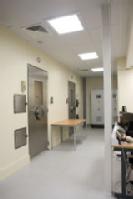£1.9 million research facility launched to combat obesity
There is new hope for a solution to Britain’s ballooning obesity epidemic with the launch of Europe’s most advanced metabolic research facility in the West Midlands, a region recently identified as the ‘obesity capital of Europe’ according to the most recent figures from the Association of Public Health Observatories.
On 1st July, University Hospitals Coventry & Warwickshire NHS Trust (UHCW), together with Warwick Medical School (WMS), launched Europe’s most advanced Whole Body Calorimeter (WBC), a facility dedicated to finding solutions for the 1 in 4 UK adults classed as obese.
The custom-built unit includes two air-locked chambers in which participants will spend up to 48 hours at a time helping scientists to explore issues including predisposition to obesity in unborn children and the link between some drugs and weight gain.
Each chamber is calibrated to measure the precise oxygen intake, carbon dioxide expelled. The WBC enables comprehensive analysis of both biochemical data and clinical observations. The facility will also be available for industrial collaborations and is already booking time with other major institutions and companies for cutting edge research that could help encourage weight loss.
The WBC will allow researchers from both WMS and UHCW to understand more about how food, physical activity and other behavioural aspects, such as sleep, affect our ability to control our weight, as well as investigating real-time changes in metabolic function associated with diabetes, obesity and their treatments.
Andy Hardy, Chief Executive at UHCW said: “Obese patients are a significant issue for the NHS. This unit will be investigating the building blocks of how the body works which is an exciting prospect that could have far reaching ramifications for hospitals and patients across the country and potentially internationally.”
Professor Sudhesh Kumar, Professor of Medicine at Warwick Medical School and University Hospital, Coventry said: “The research we will undertake at this world-class facility will shape future treatment of conditions such as obesity and diabetes, which are major healthcare priorities. This will help us make a definitive step towards understanding and controlling metabolic diseases. The research potential of this new unit is vast and we are looking forward to being able to make a difference to patients around the world with the work we do here.”
The Human Metabolism Research Unit has been jointly funded by UHCW and WMS. With £1 million from UHCW and a £900,00 contribution from WMS of which a £740,000 funding grant for Translational Medicine was awarded through the Science City Research Alliance (SCRA). The Translational Medicine project is part of a larger investment by Advantage West Midlands in the research infrastructure of the West Midlands region which unites the University of Warwick and the University of Birmingham in a strategic research partnership – SCRA, formed under the Birmingham Science City initiative.
For further information contact Kate Cox, Communications Manager, Warwick Medical School on +44(0)2476 150483/574255, m: 07920 531221 or e: kate.cox@warwick.ac.uk
Notes to Editors:
University Hospitals Coventry and Warwickshire NHS Trust is one of the largest acute teaching hospitals in the UK, comprising University Hospital in Coventry and the Hospital of St Cross in Rugby. We offer major advances in patient care, clinical teaching and innovation. We're exceeding the national waiting times targets for our patients, our maternity services were rated as amongst the best in the NHS and we have low incidence of healthcare associated infections such as MRSA and C. difficile.
The Science City Research Alliance project is part of a larger investment by Advantage West Midlands and ERDF in the research infrastructure of the West Midlands region, which unites the University of Warwick and the University of Birmingham in a newly-formed Science City Research Alliance.
Birmingham Science City is a region-wide partnership of public sector, businesses and the research base, which is facilitating the use of science and technology to improve the quality of life and prosperity of the West Midlands. Funded by Advantage West Midlands, Birmingham City Council and the region’s Universities, Birmingham Science City’s aim is to create strategies to exploit centres of world-class scientific research, by developing relevant activities for sustainable economic and social benefit.
www.birminghamsciencecity.co.uk


